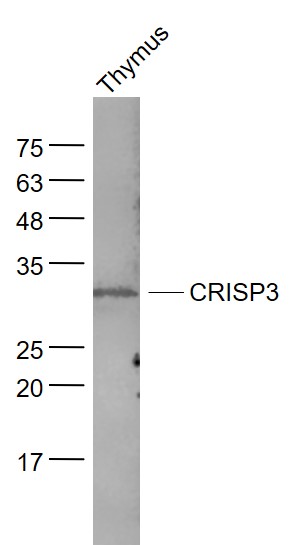CRISP3 Rabbit pAb
CRISP3 Rabbit pAb
- 产品详情
- 实验流程
- 背景知识
Application
| WB |
|---|---|
| Primary Accession | P54108 |
| Reactivity | Rat, Rabbit, Dog, Horse |
| Host | Rabbit |
| Clonality | Polyclonal |
| Calculated MW | 27630 Da |
| Physical State | Liquid |
| Immunogen | KLH conjugated synthetic peptide derived from human CRISP3 |
| Epitope Specificity | 21-120/245 |
| Isotype | IgG |
| Purity | affinity purified by Protein A |
| Buffer | 0.01M TBS (pH7.4) with 1% BSA, 0.02% Proclin300 and 50% Glycerol. |
| SUBCELLULAR LOCATION | Secreted. In neutrophils, localized in specific granules. |
| SIMILARITY | Belongs to the CRISP family. |
| SUBUNIT | Interacts with A1BG. |
| Important Note | This product as supplied is intended for research use only, not for use in human, therapeutic or diagnostic applications. |
| Background Descriptions | Cysteine-rich secretory proteins (CRISPs) represent a family of evolutionarily conserved proteins which may play a role in the innate immune system and are transcriptionally regulated by androgens in several tissues. AEG is a sperm surface protein involved in the fusion of egg and sperm. Although CRISP-1 (also designated AEG-like protein, ARP, cysteine-rich secretory protein-1 or AEG-related protein) is not the ortholog of rodent AEG, it resembles AEG in that it is an epididymal secretory glycoprotein that binds to the postacrosomal region of the sperm head. CRISP-1 coats the postacrosomal region of sperm heads as they pass through the epididymis. CRISP-1 is found in all regions of the epididymis, ductus deferens, seminal plasma and sperm. CRISP-3 is expressed in pancreas and prostate tissues and, along with CRISP-1, is expressed in saliva. The gene that encodes CRISP-3 is an early response gene that may participate in the pathophysiology of the autoimmune lesions of Sjogren’s syndrome. |
| Gene ID | 10321 |
|---|---|
| Other Names | Cysteine-rich secretory protein 3, CRISP-3, Specific granule protein of 28 kDa, SGP28, CRISP3 |
| Target/Specificity | Salivary gland, pancreas and prostate epididymis, ovary, thymus and colon. |
| Dilution | WB=1:500-2000 |
| Storage | Store at -20 °C for one year. Avoid repeated freeze/thaw cycles. When reconstituted in sterile pH 7.4 0.01M PBS or diluent of antibody the antibody is stable for at least two weeks at 2-4 °C. |
| Name | CRISP3 |
|---|---|
| Cellular Location | Secreted. Note=In neutrophils, localized in specific granules |
| Tissue Location | Salivary gland, pancreas and prostate > epididymis, ovary, thymus and colon |
For Research Use Only. Not For Use In Diagnostic Procedures.
Provided below are standard protocols that you may find useful for product applications.
BACKGROUND
Cysteine-rich secretory proteins (CRISPs) represent a family of evolutionarily conserved proteins which may play a role in the innate immune system and are transcriptionally regulated by androgens in several tissues. AEG is a sperm surface protein involved in the fusion of egg and sperm. Although CRISP-1 (also designated AEG-like protein, ARP, cysteine-rich secretory protein-1 or AEG-related protein) is not the ortholog of rodent AEG, it resembles AEG in that it is an epididymal secretory glycoprotein that binds to the postacrosomal region of the sperm head. CRISP-1 coats the postacrosomal region of sperm heads as they pass through the epididymis. CRISP-1 is found in all regions of the epididymis, ductus deferens, seminal plasma and sperm. CRISP-3 is expressed in pancreas and prostate tissues and, along with CRISP-1, is expressed in saliva. The gene that encodes CRISP-3 is an early response gene that may participate in the pathophysiology of the autoimmune lesions of Sjogren’s syndrome.
终于等到您。ABCEPTA(百远生物)抗体产品。
点击下方“我要评价 ”按钮提交您的反馈信息,您的反馈和评价是我们最宝贵的财富之一,
我们将在1-3个工作日内处理您的反馈信息。
如有疑问,联系:0512-88856768 tech-china@abcepta.com.























 癌症的基本特征包括细胞增殖、血管生成、迁移、凋亡逃避机制和细胞永生等。找到癌症发生过程中这些通路的关键标记物和对应的抗体用于检测至关重要。
癌症的基本特征包括细胞增殖、血管生成、迁移、凋亡逃避机制和细胞永生等。找到癌症发生过程中这些通路的关键标记物和对应的抗体用于检测至关重要。 为您推荐一个泛素化位点预测神器——泛素化分析工具,可以为您的蛋白的泛素化位点作出预测和评分。
为您推荐一个泛素化位点预测神器——泛素化分析工具,可以为您的蛋白的泛素化位点作出预测和评分。 细胞自噬受体图形绘图工具为你的蛋白的细胞受体结合位点作出预测和评分,识别结合到自噬通路中的蛋白是非常重要的,便于让我们理解自噬在正常生理、病理过程中的作用,如发育、细胞分化、神经退化性疾病、压力条件下、感染和癌症。
细胞自噬受体图形绘图工具为你的蛋白的细胞受体结合位点作出预测和评分,识别结合到自噬通路中的蛋白是非常重要的,便于让我们理解自噬在正常生理、病理过程中的作用,如发育、细胞分化、神经退化性疾病、压力条件下、感染和癌症。






